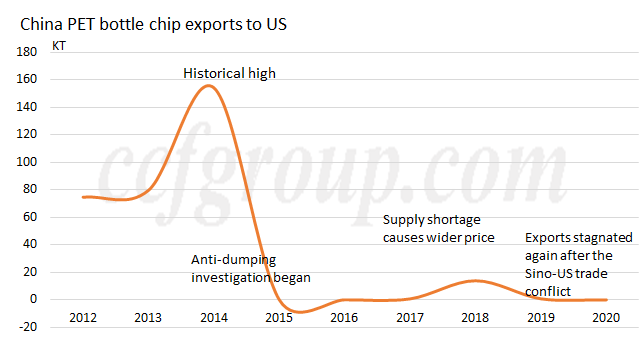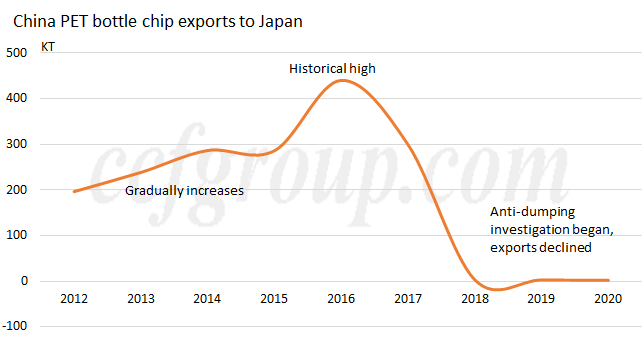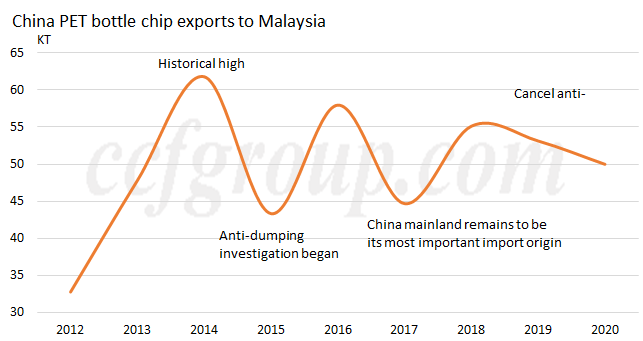Brief analysis over the trade barriers China PET bottle chip industry faces
We are to update the latest overseas trade barriers condition Chinese PET bottle chip plants face.
US and Japan anti-dumping duty on Chinese PET resin is to due in 2021-2022. US began to levy 126-162% extra tariff on Chinese PET resin since May 2016. Apr 2021, US International Trade Commission (ITC) launched the first anti-dumping and countervailing sunset review, and the preliminary results of this investigation may come out at the end of 2021.
PET bottle chip exports to US reached its highest in 2014, which was around 150kt. However, in view of the current relationship between China and US, we believe that the chance of directly abolishing anti-dumping countervailing duties is small, but it may also be good if we can get the result of tariff reduction year by year.

Japan began to collect 39.8%—53% anti-dumping duties since Dec 28 2017, duration 5 years. So around the end of 2022, Japan's anti-dumping duties on Chinese PET bottle chip will expire.
Japan's imports of PET bottle chip from Chinese mainland peaked at 440kt in 2016.As a net importer, Japan has small capacity which cannot meet domestic consumption demand. Its annual import volume is basically around 900-1000kt. After levying ADD on Chinese materials, the local downstream factories in Japan directly bear the consequences of high pricing. Basically, suppliers from Southeast Asia and East Asia can sell goods to Japan market adding dozens of dollars. If the anti-dumping duty expires, it will be a win-win result for both Japan and Chinese suppliers. If all goes well, PET bottle chip trade between China and Japan will be back on the right track in 2023.

Brazil's anti-dumping duties on China PET resin are also about to expire at the end of this year. Brazil began to collect 87.23%-682.38% ADD on Chinese PET resin since Nov 28 2016, duration 5 years. China's exports to Brazil basically ranges between 20-50kt. Since trading mainly focused on 1-2 enterprises, hence the cancel of ADD has little impact on the industry. And taking into account the relationship between Brazil and US government, the probability of cancellation in the later stage is not high.
PET exports to Malaysia market once also declined after ADD was collected since 2015. However, as Far Eastern Shanghai accounts for nearly 50% of the total exports, while Malaysia government doesn't impose high tariffs on the company, hence China PET resin exports to Malaysia hold stable at around 50kt later on. Local PET bottle chip capacity totals 215kt, and the annual apparent demand is about 90kt, hence part of the production is for export. So it is reasonable to announce the abolition of anti-dumping duties in 2021.

Overall, if Japan and other countries canceled anti-dumping duties later on, considering that the export volume of China PET bottle chip has reached as high as 3.15 million tons in 2019, then it is not impossible for it to reach or even exceed 3.5 million tons in the future. High freight is periodical, in the later stage, once the freight charge returns to normal, China export market is still likely to see an outbreak.
- Top keywords
- Cotton Price
- Cotton Futures Price
- Cotton Futures
- CZCE
- PTA Futures Price
- Chemical Fiber
- Polyester Prices
- Wool price
- PTA Futures
- Shengze Silk
- China
- Yarn Price
- price
- China Textile City
- Fibre Price
- Benzene Price
- Cotton
- Index
- Cotton Index
- PTA
- fabric price
- NYMEX
- Top 10
- textile industry
- Spot Cotton
- Cotton Yarn
- Polyester Price
- Futures
- PTA Price
- cotton yarn price

